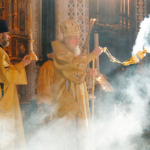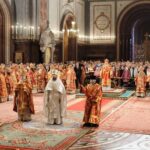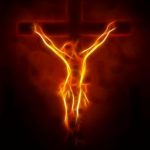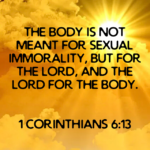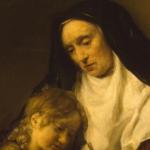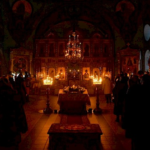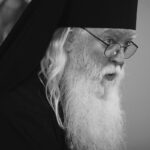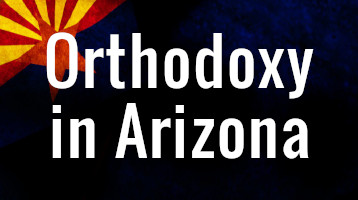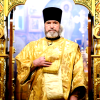From the Inkless Pen, the Blog of Fr. Zechariah Lynch Below the reader will find my translation from the Russian of sermon number 15 by St. Seraphim (Zvezdenski), On the Divine Liturgy. These sermons by St. Seraphim are of the uttermost importance for Orthodox Christians today. He tells us clearly that there is no greater gift on Earth than the Divine Liturgy. The Divine Liturgy is the very heart and soul of the Body of Christ. St. Seraphim makes clear to us today the extent that the early Christians went to in order to protect and attend the Liturgy. Speaking from the harmonious voice of the Fathers, he tells us that for the sake of the Divine Liturgy the sun shines and the earth brings … [Read more...]
Thanksgiving: A Day Set Aside to Give Thanks to God
We have much to be thankful for. by Abbot Tryphon Thanksgiving has officially been an annual tradition since 1863, when during the Civil War, President Abraham Lincoln proclaimed a national day of thanksgiving to be celebrated on Thursday, November 26. The “First Thanksgiving” was celebrated by the Pilgrims after having been safely delivered by God to the shores of the New World. This feast lasted three days, providing enough food for thirteen Pilgrims and ninety Native Americans. The feast consisted of fish (cod, eels, and bass) and shellfish (clams, lobster, and mussels), wild fowl (ducks, geese, swans, and turkey), venison, berries and fruit, vegetables (peas, pumpkin, beetroot and … [Read more...]
On Thanksgiving
by Fr. Stephen Freeman Everyone capable of thanksgiving is capable of salvation. - Fr. Alexander Schmemann I do not believe it is possible to exhaust this topic. I have set forth a few suggestions of how we might build and maintain a life of thanksgiving. Particular thought is given to those times when giving thanks is difficult. 1. I must believe that God is good. I struggled with this for many years. I believed that God was sovereign; I believed that He was the Creator of heaven and earth; I believed that He sent His only Son to die for me. But despite a host of doctrines to which I gave some form of consent, not included (and this was a matter of my heart) was the simple, … [Read more...]
The Moral Heresy of Sexual Immorality
by Fr. Zechariah Lynch In true Christianity — Orthodoxy — right faith and living go hand in hand. For instance, a person cannot confess that "Jesus Christ is not God" and be an Orthodox Christian. In confessing something contrary to the revelation of God in His Church, such a one is setting himself at odds with that revelation. Of course, one may repent, that is, change his faulty confession and receive the true confession of Christ in His Church. Yet a person who willingly persists in a false teaching, willingly sets himself outside of Christ and His Body. A person who rejects the manifest teachings of true Christianity is not a Christian at all. Such a one subscribes to heresy and is a … [Read more...]
The Bible, the Church, and Homosexuality
by Fr. John Whiteford When it comes to the interpretation of the Scriptures we speak of "exegesis" (which refers to bringing the correct meaning of the text out through proper interpretation) and "eisegesis" (which is reading an incorrect meaning into the text of Scripture that is not in fact there), but in the case of the recent article "Orthodox Pastoral Response in the Past to Same-Sex Behavior", written by an anonymous author we have to coin a new term to describe its peculiar approach to Scripture: "obscurantegesis" (which is the intentional obscuring of the meaning of a text or texts of Scripture). It is clear that the anonymous author is not interested in what the Church has actually … [Read more...]
St. Herman’s Youth Camp Conference in Phoenix, December 26-30, 2022
St. Herman’s West 2022 will be held this year at Christ the Savior Orthodox Church in Youngtown (near Phoenix), AZ. Arrival is December 26 with departure on December 30. The conference will include a work project — building a walkway for processions at the church, panel discussions, lectures by Fr. George Kaplanov, liturgical workshops, a hierarchal liturgy, and social interaction in beautiful areas of Phoenix and Old Town Scottsdale. Come out for a break from winter weather and an injection of new life into your Orthodox life! Registration for parishioners of the ROCOR Western American Diocese opens October 1. Register Here. The cost for youth is $275 for first family member, $250 for … [Read more...]
Home Bible School
by Fr. Patrick Henry Reardon Before he ever met the Apostle Paul, the life of young Timothy was already full of blessings. Indeed, Paul himself, among the last lines he wrote on this earth, reminded Timothy of those blessings: “But you must continue in the things which you have learned and been assured of, knowing from whom you have learned them, and that from childhood you have known the Holy Scriptures, which are able to make you wise for salvation through faith which is in Christ Jesus” (2 Tim. 3:14–15). Both Paul and Timothy knew who were the latter’s first teachers of Holy Scripture. Paul wrote earlier in this same epistle, “I call to remembrance the genuine faith that is in … [Read more...]
Transfiguration and the Cross
By George Mantzarides Professor at the School of Theology, University of Thessaloniki Are you aware that counting 40 days from Transfiguration, on the 40th day we celebrate the Exaltation of the Holy Cross? It’s not a mistake. The Transfiguration of Our Savior has a central place in the Orthodox Church and in Orthodox theology. It is the event that reveals the glory of the Church and of the faithful. It is a witness to the new reality introduced by the coming of Christ in history. During His Transfiguration, Christ revealed the Uncreated Glory of His Divinity within His human nature. At the same time, He took up those surrounding Him into His Uncreated Divine Glory. Moses and Elias … [Read more...]
Appreciating Vespers
by Fr. Lawrence Farley The service of Vespers is, I think, dramatically under-appreciated today. The temptation for us busy people is to reduce our church-going to Sunday mornings only, and let everything else slide. Since we under-appreciate Vespers, it often tends to slide with other things we deem relatively unimportant. But Vespers warrants a second look, and a renewed appreciation. The word “vespers” comes from the Greek ἑσπέρα (hespera) and the Latin vesper, both meaning “evening”, because it is the evening service of the Church. Christians are to pray to God not just on Sunday mornings, but constantly, sanctifying time by offering prayer throughout the day. In the eighth chapter of … [Read more...]
Need a Reason for Embracing Orthodoxy?
by Abbot Tryphon One of the most powerful reasons for embracing Orthodoxy is to be found in the Church’s insistence that she holds to the evangelical and apostolic doctrine of the Ancient Church. In an age when everything is up for change, there is a certain security and stability when one institution (the Church) stands firm in her Apostolic Authority, and refuses to allow popular culture or political correctness to influence her rightful role as hospital for the soul. “It is not lawful to differ even by a single word from the evangelical and apostolic doctrine, or to think otherwise than as the blessed Apostles and our fathers learned and taught concerning the Holy Scriptures," (Saint … [Read more...]
- « Previous Page
- 1
- 2
- 3
- 4
- 5
- 6
- …
- 10
- Next Page »
